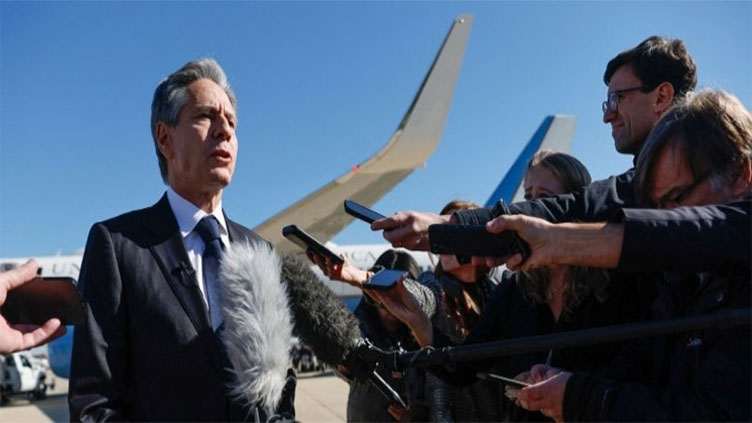Blinken will discuss in Israel steps to minimize harm to Gaza civilians

World
Blinken said discussions will also focus on the future of Gaza when and if the Hamas are defeated.
WASHINGTON (Reuters) - U.S. Secretary of State Antony Blinken on Thursday said he would discuss during a trip to Israel "concrete steps" that should be taken to minimize harm to Gaza civilians amid mounting alarm over soaring casualties in Israel's bombardment of the enclave.
Speaking to reporters before departing on his second Middle East trip in less than a month, Blinken said discussions will also focus on the future of Gaza when and if the Palestinian group of Hamas are defeated, getting more humanitarian aid into Gaza and ways to ensure the conflict does not spread. Securing the release of more than 200 hostages kidnapped by Hamas will be another topic on the trip, Blinken said.
A White House official said Blinken will urge the Israeli government to agree to a series of brief cessations of military operations in Gaza to allow for hostages to be released safely and for humanitarian aid to be distributed.
The top American diplomat, who will visit Jordan following Israel and before he heads to Asia next week, reiterated Israel's right to defend itself but said both the country and the United States had a responsibility to ensure protection for civilians caught in harm's way.
"We will be talking about concrete steps that can and should be taken to minimize harm to men, women and children in Gaza, and this is something that the United States is committed to. I'm not going to get into the details here, but it's very much on the agenda," Blinken said.
"When I see a Palestinian child – a boy, a girl – pulled from the rubble of a collapsed building, that hits me in the gut as much as seeing a child from Israel or anywhere else. So this is something that we have an obligation to respond to, and we will," he added.
The latest war in the decades-old conflict began when Hamas militants broke through the border on Oct. 7. Israel says they killed 1,400 people, mostly civilians, and took more than 200 hostages in the deadliest day of its 75-year history.
Israel's ensuing bombardment of the Palestinian enclave of 2.3 million has killed at least 9,061 people, including 3,760 children and 2,326 women, according to Gaza health authorities.
Though the United States and other Western nations have traditionally supported Israel, harrowing images of bodies in the rubble and hellish conditions inside Gaza have triggered appeals for restraint and street protests around the world.
The United States has thrown its full support behind Israel but the administration's tone and focus has shifted as the civilian death toll rose and the humanitarian situation in Gaza deteriorated.
The first evacuees started leaving Gaza this week at the Rafah crossing into Egypt. The United States said 79 of its citizens had left in the two days since the crossing opened. Blinken said he expected more evacuations over the coming days.
DOES ISRAEL HAVE AN EXIT STRATEGY?
As the Israeli ground offensive started, concern over whether Israel has an exit strategy or a plan for what comes next has began to mount.
Washington has been speaking with Israel and other countries in the region on how to govern the Palestinian territory if Israel triumphed on the battlefield, but a clear plan is yet to emerge.
Earlier this week, Blinken said Washington as well as other countries are exploring a number of options for the future of Gaza, which he said may include international agencies and other countries in the region but did not give further details.
On Thursday, he said this and more broadly laying the groundwork for a future Palestinian statehood will be part of the conversations with Israel and Jordan.
"I think understandably people are very focused on the day of, not just the day after. But we do have to have conversations now about how we can best set the conditions for a durable, sustainable peace – durable, sustainable security for Israelis and Palestinians alike," he said.


